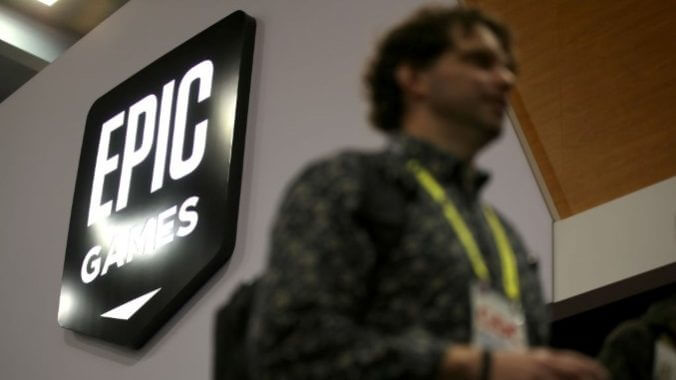They Print Pink Slips, Not Paychecks: The Rash of Videogame Layoffs

Although 2023 has been a banner year for videogames, we’ve seemingly wandered into a Ones Who Walked Away From Omelas situation: Our gaming utopia exists because of the widely known and generally accepted suffering of others. Much like the discarded child who exists in filth, misery, and squalor so Omelas can thrive in Ursula K. Le Guin’s short story, the developers of our favorite games are routinely sacrificed in the name of profitability. These artists, programmers, narrative designers, Quality Assurance testers—anyone who isn’t a studio executive, really—have been deemed unnecessary and expendable. Cowardly leadership couches the bloodletting in euphemisms: redundancies, layoffs, slimming down for agility, cuts, firing, termination. They can’t face the ruination they’ve caused directly.
While I was writing this piece, five companies cut staff or shuttered completely. Team17, the British developer and indie publisher, “amicably” parted ways with Digital division CEO Michael Pattison and will cut close to 50 jobs, mostly in QA. (Team17’s CEO Debbie Bestwick, who is stepping down at the end of the year, was one of the 10 highest paid CEOs of 2021 at $10.2 million.) The Last of Us and Uncharted developer Naughty Dog—who spent $220 million on The Last of Us Part II, according to a poorly redacted court document—prematurely ended the contracts of at least 25 staffers, also mainly QA testers. With their contracts not officially over until the end of October, the cut employees are being asked to continue working until then, allegedly without the promise of severance. Two smaller studios—Dang! and Puny Human—are closing, the first due to a lack of funding, the second because a client refused to pay them for previously agreed upon services. Puny Human also laid off 14 employees over the summer for the same reason. Telltale Games became one of the first studios to be hit with the Double Tap: closing almost completely in 2018, reopening under new leadership in 2019 to release a single game before laying off most of its staff in September.
Five studios, over 100 workers affected. That’s a summary of the past five days. The rest of the year has been much, much worse. If I were to list everything out, it would sound like a nerdy, capitalist-nightmare version of Billy Joel’s “We Didn’t Start the Fire,” so here’s some of the most atrocious events in no particular order:
- Saints Row developer Volition was taken out back and shot by parent company Embracer Group, whose billion dollar acquisition spree screeched to a halt after their high-profile deal with Savvy Games Group (the gaming arm of Saudi Arabia’s Public Investment Fund) fell through.
- Videogame engine creator Unity let go of 600 employees back in May. Four months later, their CEO John Riccitiello (sixth highest paid CEO of 2021) announced a massively controversial runtime fee that would have financially devastated indie studios. Although they have rolled back some of the worst components of the fee after major backlash, the bridge has already been burned. Maybe Riccitiello can use some of the money he made selling shares prior to the announcement to help rebuild it. Or not, considering he stepped down. A new punching bag — I mean CEO — will be appointed immediately, although Riccitiello will remain employed with the company until April of 2024.
- After launching the mixed-but-promising magical FPS Immortals of Aveum, developer Ascendant Studios celebrated by firing half of their staff due to “poor sales.” The game launched as an EA original.
- BioWare, the developers of Mass Effect and Dragon Age, spontaneously cut 50 jobs—including legendary senior narrative designer Lukas Kristjanson—in an effort to become a “more agile and focused studio.” The terminations came as a direct order from parent company EA, who themselves fired 6% of their global workforce (about 800 employees) after letting go of over 200 Apex Legends testers in February. This all comes as a surprise considering the company’s staggering 2022 net revenue of $7 billion and CEO Andrew Wilson’s $20 million paycheck. Oh, and seven of former employees are also suing BioWare for adequate severance due to their “termination without cause.” The employees claim that they were guilted into not asking for full severance, as the cost would further delay the troubled Dragon Age: Dreadwolf.
- Riot Games, CD Projekt Red, Ubisoft, and Firaxis have also all laid off 30 or more employees. CDPR has been hit by so many layoffs that workers are attempting to unionize the entire Polish games industry, but management might be reluctant to recognize them.
- Meta—which has tried to expand into the VR industry by acquiring Sanzaru Games, Ready at Dawn, and two other studios—promised to cut 10,000 employees across the entire company before the end of the year. For “efficiency.”
The winner of the Biggest Fuck-Up, however, belongs firmly to Tim Sweeney, the CEO of Epic Games who—despite printing money with Fortnite and owning multiple of the industry’s best game engines—fired 1,050 employees. They also sold their recently acquired music platform Bandcamp to music marketing company Songtradr, which threatens to harm the culture of the beloved and independently focused website for musicians. Oh, and Epic also “spun off” internet safety company SuperAwesome (which they purchased in 2020), whatever that means. In a memo shared online, Sweeney, who was previously valued at $7.4 billion, claims that layoffs are due to their poor profitability as the company shifts focus and investment into the metaverse, every dork’s favorite marketing term. Epic owned studios, such as Fall Guys developer Mediatonic and Rocket League creators Psyonix, were majorly affected.